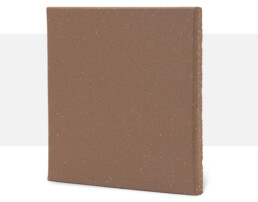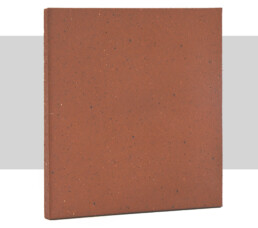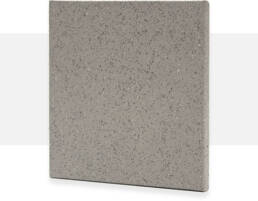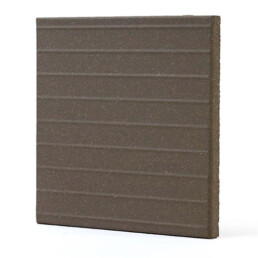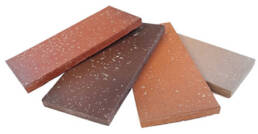Quarry Tile Flooring From Metropolitan Ceramics
Quarry Tile Flooring
When it comes to choosing the right type of tile for your business or even your home, there are many options to consider. One popular choice is quarry tile, which is favored by operators of demanding industries, such as commercial kitchens and food processing facilities.
Quarry tile is chosen for such applications because of its durability and resistance to moisture. However, not all quarry tiles are created equal. This blog post will compare Metropolitan Ceramics quarry tile to other manufacturers’ options. Let’s look at the Metropolitan Ceramics difference.
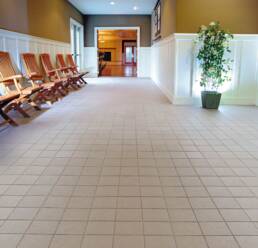
What Is Quarry Tile?
Quarry tile is a type of floor tile that is made from natural clay and shale. It is known for its hardness and ability to withstand extreme temperatures and moisture, which make it a popular choice for high-traffic areas like commercial kitchens, hallways and entryways, food processing plants, breweries, convenience stores, and more. It is a type of ceramic tile that is unglazed, which gives it a natural, rustic look. Quarry tile has a vitreous nature, making it suitable for outdoor applications as well. High-quality quarry tile, such as that from Metropolitan Ceramics also features a dynamic coefficient of friction well above the industry guideline of .42, helping to prevent slips and falls.
Quarry tile is produced in a variety of colors, from earthy browns, tans, and reds to more modern shades like gray and black. The tiles are solid, with the color running through the body of each tile.
Extruded vs. Pressed Quarry Tile
The method used to produce a quarry tile makes a big difference when it comes to its strength and quality. There are two ways to manufacture quarry tile: extrusion and pressing. Extruded quarry tile is made by forcing clay through a die. This process contributes to the product’s life expectancy of 50 years or more.
Pressed quarry tile is made by compressing clay into molds. This process can result in slight variations in size and thickness — a look some homeowners prefer. Both types of quarry tile are functional, but there are some differences to consider when choosing a tile.
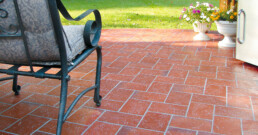
Metropolitan Ceramics quarry boasts uniformity in size and thickness, which makes it easier to install evenly. Because of the pressure placed on the clay during the extrusion process, it is also less likely to have imperfections, such as air pockets or cracks, which can compromise the tile’s strength. Pressed quarry tile is less dense than extruded tile, which can compromise its durability and ability to resist moisture.
Another important difference when it comes to quarry tile strength is thickness. Metropolitan Ceramics quarry tiles have a thickness of ½ inch, whereas many other tiles have a thickness of only ¼ or ⅛ inches. The extrusion process, a method that Metropolitan Ceramics company has used in brick and tile making for more than 150 years, creates an extruded quarry tile that outperforms its pressed alternatives.
Metropolitan Ceramics Offer More Types of Quarry Tile
Metropolitan Ceramics offers four quarry tile product lines through our professional distributor networks:
QuarryBasics® Ironspot: Integrates small iron particles throughout the tile body, resulting in a subtle speckled appearance, while still maintaining a Dynamic Coefficient of Friction ≥ .60 at time of manufacture. The unique blend of durability, along with a focus on safety and appearance, positions QuarryBasics Ironspot as the preferred option for demanding projects.
QuarryBasics® XA Abrasive: All the durability and slip-resisting properties of our QuarryBasics® line with a silicon-embedded surface and a metallic additive through the body of the tile to create a one-of-a-kind tile with added slip-resisting properties. This line is appropriate for the most challenging environments where slip prevention is essential.
The Metropolitan Ceramics Quarry Tile Investment
Metropolitan Ceramics puts its quarry tiles through rigorous testing so that we can offer a commercial flooring product that will remain undamaged and retain its aesthetics and safety characteristics for decades. The exceptional technical characteristics of our quarry tiles make them appropriate for virtually any application suitable for tile. We meet or exceed ASTM standards in 13 areas including abrasion resistance, breaking strength, freeze/thaw, shear bond strength, chemical resistance, stain resistance, and scratch hardness.
This means that quarry tile from Metropolitan Ceramics is your best investment when it comes to commercial flooring for challenging environments. Contact us to learn more about Metropolitan Ceramics quarry tile lines or find a distributor of our products.
Gray Quarry Tile: Enduring Style and Superior Functionality
When it comes to choosing the perfect flooring option for your demanding commercial environment, performance and timeless style can harmoniously coexist. In the world of tile, one option stands out for its superior functionality as well as aesthetics: quarry tile.
Its enduring nature can be attributed to its superior strength, but its attractive, natural colors and texture also make it an attractive option. Neutral iterations of this material, such as gray quarry tile, have become a go-to choice for both residential and commercial spaces. In this blog post, we will explore the many reasons why gray quarry tile is a widely-selected product in the flooring market.
Gray Quarry Tile: Contemporary Hues for Workhorse of Tile
Although its name suggests something that comes straight from the earth, quarry tile is actually made from clay and shale that are fired at high temperatures, resulting in an extremely hard-wearing surface. Quarry tile comes in a handful of earthy colors. Different hues are produced by altering the natural raw materials put into the “recipe.” Tiles with a base of shale generally have a red or brown color. Grays and beiges, both popular choices in contemporary architecture and design, typically have a clay base. The distinctive unglazed finish of gray quarry tile, as well as that of its red and brown counterparts, adds authenticity and character to any space. While many commercial kitchens once favored red and brown shades of quarry tile, newer projects, from restaurant kitchens to food manufacturing plants are now opting for shades of gray. None of the durability is compromised from color to color.
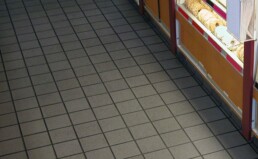
The Benefits of Quarry Tile: Functionality Meets Durability
Quarry tile offers benefits that make it a popular choice for commercial spaces. Its functionality and durability are unmatched, making it an ideal flooring option for high-traffic areas, or spaces that see extreme temperatures, such as freezers or kitchens in which very hot equipment or spills, such as hot grease, are a factor.
Metropolitan Ceramics’ quarry tile owes its superior durability to high-quality clay and minerals as well as our time-tested manufacturing process. Our parent company’s brick-making tradition began just after the Civil War, and our quarry tile operation, which began in the 1970s, borrows heavily from brick-making. Our quarry tile, like brick, is formed through an extrusion process. Unlike lesser products pressed into a mold, our quarry tile is pushed through a machine under very high pressure, a process that extracts the most water. The more moisture that is removed in the formation process, the less absorbent each tile is, which translates to a stronger and more durable quarry tile.
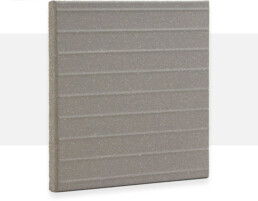
After extrusion and cutting, our quarry tiles are then dried and kiln-fired at temperatures that exceed 2000 degrees Fahrenheit — hotter than the temperature at which other ceramic tiles are fired. The high temperature increases the density of quarry tile, which helps the product resist moisture, oils and greases, mold and bacteria growth, stains, and scratches. Most importantly for environments like commercial kitchens, quarry tile’s density and unglazed finish make its surface texture naturally slip-resisting. It is the right choice for wet conditions.
The extensive production process and the attributes of quarry tile make it a more expensive option upfront, compared to some other options, such as laminate or sheet vinyl. However, an independent study from the Tile Council of North America that examined lifetime costs of various commercial flooring materials found quarry tile had the lowest cost per year over the lifespan of the floor. Moreover, despite the superior lifespan of quarry tile, it is a less expensive option than alternatives such as poured epoxy or ceramic.
Another important feature of quarry tile is its ability to withstand extreme outdoor or indoor temperatures. It stands up, year after year, to the scorching sun as well as the punishing environments of walk-in freezers and Northern winters. This is partly because quarry tile does not absorb water the way many other flooring materials do. Therefore, our tiles do not crack when the absorbed water freezes.
In terms of style, gray quarry tile is both on-trend at the moment and has a timeless neutrality that can complement most design aesthetics. It provides a versatile basis for any color scheme, especially when brown undertones are present in the gray tile.
Maintaining quarry tile is a straightforward process, requiring daily sweeping or vacuuming and mopping. To mop, combine two gallons of hot water and four ounces of Hillyard Assurance® cleaner. For the QUARRYBASICS XA Abrasive Series the use of a nylon/poly looped end mop is recommended.
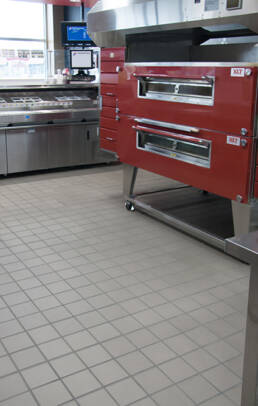
With proper installation and care, quarry tile can withstand heavy use for decades while maintaining its timeless appeal.
Design Inspiration: Quarry Tile is a Building Block
Gray is an excellent choice when it comes to quarry tile colors. Styles change. While you might be trying to create a rustic look today, in the future, your tastes might veer toward something more modern. Gray quarry tile can shift with you. Whether used in residential or commercial environments, this versatile option offers both style and practicality.
Gray is an excellent choice when it comes to quarry tile colors. Styles change. While you might be trying to create a rustic look today, in the future, your tastes might veer toward something more modern. Gray quarry tile can shift with you. Whether used in residential or commercial environments, this versatile option offers both style and practicality.
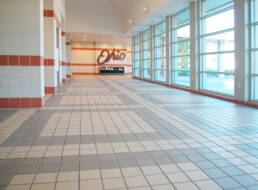
Gray quarry tile is the perfect, on-trend choice not only for commercial kitchens but for any environment where durability and safety are non-negotiable, but contemporary style is desired as well, such as convenience stores, or automobile showrooms. Quarry tile also makes an ideal fireplace surround, offering warmth, sophistication and superior heat resistance. Outdoors, gray quarry tile makes a safe, durable patio material.
With its ability to blend seamlessly with different design styles, gray quarry tile allows you to create a cohesive look throughout your home or business. Whether you are going for a classic aesthetic or contemporary vibe, this versatile flooring material can help bring your vision to life.
Metropolitan Ceramics Offers an Array of Gray
Metropolitan Ceramics, with a history that dates back more than 150 years, is a leading producer of quarry tile and thin brick products. We are proud that millions of square feet of our quarry tile has been installed throughout the United States.
If it is gray quarry tile you are looking for, we have your color in one of our QuarryBasics® lines of unglazed ceramic quarry tile. QuarryBasics® products are the foremost natural, unglazed, high density ceramic quarry tile made in the U.S.A. These tiles are extruded, not pressed, and fired in kilns at extremely high temperatures to create quarry tile that is very low absorption (vitreous), slip-resisting, and extremely durable. Metropolitan Ceramics’ QuarryBasics® quarry tile meets or exceeds eight durability tests, including breaking strength and abrasion resistance.
We offer gray tones in a Pewter 6″ x 6″ tile; a nearly-black Raven option in 4″ x 8″, 6″ x 6″, and 8″ x 8″ sizes; and a Puritan Gray shade with black speckling throughout the body of the tile and on the surface in a 6″x6″ tile.
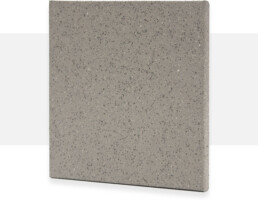
Reach out to Metropolitan Ceramics today for more information about incorporating this functional, naturally beautiful tile into your project.

